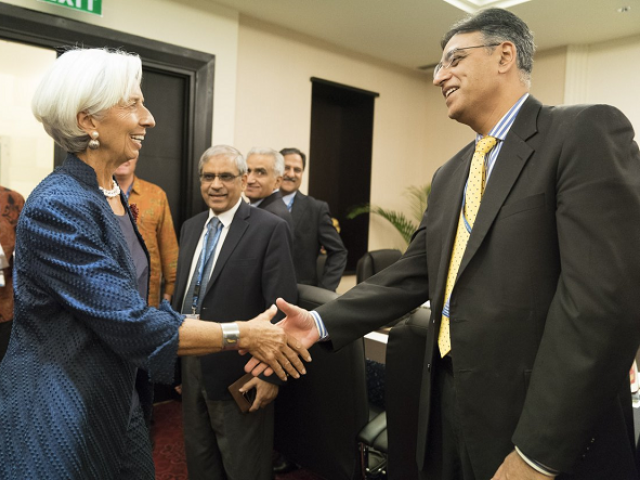Pakistan sees no immediate need to hike power tariff
IMF terms hikes insufficient during video conference between Asad Umar and fund official

Finance Minister Asad Umar (R) and IMF Chief Christine Lagarde (L). PHOTO COURTESY: TWITTER @IMFNews
During Thursday’s video conference with the IMF, Pakistan’s position was that there was no immediate requirement to increase the power rates, according to some government officials. It was the second video contact in the past two weeks between Finance Minister Asad Umar and IMF’s mission chief.
The government was also averse to the idea of further jacking up interest rates, which despite being almost doubled to 10.25% by the central bank remain below the IMF’s expectations.
Meanwhile, Minister of State for Revenue Hammad Azhar also said the Pakistan Tehreek-e-Insaf (PTI) government will not slap more taxes before next budget.
IMF assistance: Talks with Pakistan focus on policy priorities, reforms
All this suggests that Pakistan and the IMF may not be able in a position to clinch a deal at least by May when the PTI would present its first comprehensive budget for fiscal year 2019-20. The formal talks between the IMF and Pakistan for a bailout package ended inconclusively in November last year.
During Thursday’s discussions, the focus remained on electricity tariffs and interest rates, said the officials. But these were the two areas where the government was not willing to make any major move due to its negative political implications and adverse impacts on sentiments of the investors.
The government has increased average electricity prices by Rs1.27 per unit instead of Rs3.82, which is less than one-third of what was recommended by the National Electric Power Regulatory Authority (Nepra). The government had exempted those who consume less than 300 units of electricity, which according to Umar were 70% of the total consumers.
Pakistan would share data from the efficiency gains in the power sector with the IMF with an objective to prove its point that the Power Division’s campaign to cut line losses and improve recovery of bills was working. However, the IMF was pressing to implement the next phase of increase in power tariffs.
“Productive discussions took place with the IMF on all areas including fiscal, energy, structural reforms and monetary policy”, said Adviser to Finance Ministry Dr Najeeb Khaqan while commenting on the IMF discussions. He said the two sides exchanged views on the data. The discussions were part of regular ongoing interaction with the IMF and it will continue in coming weeks as well, said Dr Khaqan.
Asad Umar told the PM’s Economic Advisory Council this week that the IMF’s conditions were not in the interest of Pakistan, as these would put unnecessary burden on people.
Hammad Azhar also said on Thursday that the government will not impose additional taxes before the next budget and the IMF’s demand for additional taxes was now less than half a percentage point of the GDP. He did not disclose the exact amount of tax that the IMF wanted Pakistan to impose.
“We are constantly engaged and the fund has softened its conditions compared with the initial demands that it had put at the start of the negotiations,” said the stat minister.
He said the government has secured sufficient financing and when it found that the IMF conditions would not put burden on the masses, the government would sign the programme.
It was for the first that that Pakistan received huge foreign economic assistance without being in the IMF programme, said Azhar while referring to $14.5 billion commitments by China, Saudi Arabia and UAE.
The minister vowed that the drive against high net worth individuals who are outside the net would escalate in coming weeks. Pakistan has received information from 29 countries under the Organization for Economic Cooperation and Development agreement.
PM Imran advised caution on IMF bailout deal
Azhar said the details from about eight to ten more countries have also been sought under the multilateral arrangement. He said the Federal Board of Revenue (FBR) is profiling the information aimed at taking actions against those who have hidden their assets.
He said the FBR chairman has removed corrupt officers from their positions and now has appointed people of his own choice at key positions of members and chief commissioners. He said instead of witch hunting the government has decided to adopt a systemic approach to end corruption in the FBR.
The FBR’s internal audit wing would now report to the PM’s Office to ensure accountability of its officers. “The FBR’s performance assessment system has become obsolete and it is now an entitlement instead of performance evaluation of the officers,” said the revenue minister.
To a question, he said the decision to separate tax policy from the FBR’s operations is at final implementation stage, vowing that the PTI government would not give in to internal FBR pressure.


















COMMENTS
Comments are moderated and generally will be posted if they are on-topic and not abusive.
For more information, please see our Comments FAQ